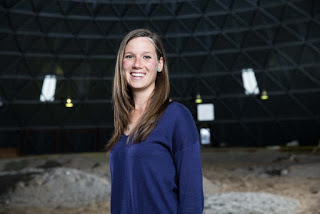Natalie Panek, Mission Systems Engineer at MDA Space Missions

Natalie Panek, Mission Systems Engineer at MDA Space Missions
#WiMHearHerStory | @WomeninMFG

At Women in Manufacturing, we are committed to supporting women in the manufacturing sector. We firmly believe that mentorship and community-building will help attract and retain women in manufacturing. As part of our mission, we feature on our blog the stories of women we admire who are currently working in manufacturing. The following is the latest installment of our "Hear Her Story" series.
Please tell our readers a little bit about your job and what your work looks like every day.
I have worked on some amazing projects over the past few years. I've driven a solar-powered car across North America, learned how to fly a plane, and interned at NASA. Now I work on space robotics. Examples of projects I am involved with are designing the locomotion system for a Mars rover and designing robotic arms to repair satellites on orbit that have broken components or have run out of fuel. Imagine an orbital tow truck! My days are spent either at a computer using 3D models to rehearse a mission, planning the test phases of our programs, or in our clean rooms testing hardware.
How did you arrive at your current position? What attracted you to a career in manufacturing?
I have a lifelong dream of becoming an astronaut and traveling to space. So pursuing engineering and manufacturing seemed like a natural skill set to prepare me to travel beyond the boundaries of Earth. I also love to get my hands dirty and play with technology, which a career in manufacturing certainly provides.
At WiM, much of our work is dedicated to refuting outdated stereotypes about the manufacturing sector: stereotypes like the workplaces are dirty and dangerous and that the field and skills required are a better fit for men. Have you encountered stereotypes like these in your education or career and how did you overcome them?
While there are challenges in any industry, I think women need to focus more on why we love what we do – flying, working with robots, designing spacecraft as examples – rather than the challenges. We must inspire and we can do this by sharing our positive stories, volunteering at outreach events, or even speaking at local schools. Making ourselves accessible to a generation of young women will naturally shatter outdated stereotypes.
Research shows that women, especially women in STEM fields, do better if they have a mentor. Has mentorship played any role in your career?
Mentorship is so important because it offers high-quality opportunities for young women to engage with, ask questions, and interact with someone in their possible field of interest. This provides a gateway to opportunities that young women may not have otherwise had. Access to professional women in manufacturing and tech fields provides options for rewarding career paths, while building confidence in girls and opportunities to discover new interests. I am grateful for a number of mentors (both men and women) throughout my career including Maryse Carmichael (first female Commander of the Canadian Snowbirds) and my first supervisor at NASA, Dr. Henning Leidecker. They taught me the value of curiosity and in following the road less traveled.
One of the key findings in WiM’s survey is that there is significant overlap between what young women want in careers and the attributes of careers in manufacturing today. But the survey also found that, too often, young women are not aware of the opportunities available in manufacturing. What do you think can be done to spread the word to women about career options in modern manufacturing?
A lack of role models is an inherent obstacle to young women pursuing manufacturing. I am a tireless advocate for more women in manufacturing and engineering at the forefront of the media – women discussing intelligent topics on TV, social media etc. so that young women recognize these positive examples of women succeeding in non-traditional roles on a regular basis. A great example is metal fabricator and land speed record holder Jessi Combs! We need the next generation of women to perceive manufacturing and STEM (Science, Technology, Engineering, and Math) as careers that are attainable by everyone. Paving the way for future generations of women in STEM is as simple as ensuring that the majority of youth can identify a woman in trades, technology, or engineering instead of a reality TV star!
Our survey also found that the majority of women in manufacturing today would recommend the sector to young women considering career options. Would you recommend a career in manufacturing? And, if so, why?
Absolutely! Manufacturing provides so many opportunities for fulfilling work and to succeed in situations outside of your comfort zone. My advice for young women looking to get into my field (aerospace or any other manufacturing field) is to dive head-on into challenge! See challenge and risk as a means to lifelong learning and opportunities to push your limits.
